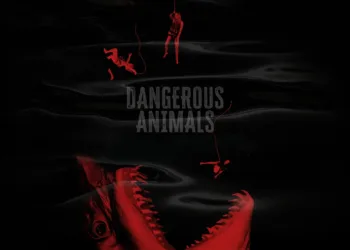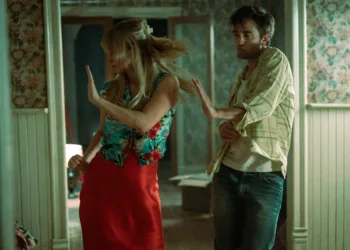June 24, 1993, Nigeria teeters on the edge of hope and upheaval as citizens await the results of an election that promises a return to civilian rule. Eleven-year-old Remi and his eight-year-old brother Akin find themselves whisked away from their quiet village to the roar of Lagos streets by their father, Folarin, a man they barely know.
What begins as a promise to collect overdue wages for his work soon takes on greater significance when they learn the ballots favor the people’s candidate, MKO Abiola—only to have those hopes dashed by a sudden military annulment.
The boys’ wide-eyed excitement collides with growing tension as they witness both the city’s bright promise and its darker undercurrents, setting the stage for an emotionally charged exploration of family bonds, political turmoil, and a father’s attempt to share a pivotal moment with his children.
From Village to City: An Episodic Odyssey
The film unfolds through a series of discrete but connected episodes. It opens with the brothers’ surprise as Folarin arrives unannounced, then follows their bumping bus ride to Lagos. Once there, Folarin’s errands take them to his workplace—where he stakes his claim for months of unpaid wages—before he treats them to simple pleasures: a beach where salt spray lends clarity to his earnest instruction, a nostalgic fairground filled with homemade thrills, and a favorite bar where he exchanges knowing glances with an old friend.
As the day progresses, archival clips of campaign rallies and voices on boomboxes remind viewers of the larger stakes, while a sudden barroom celebration erupts into chaos when the election is revoked.
Childlike play—remastered through paper cutouts of The Undertaker wrestlers—and moments of unguarded wonder sit alongside scenes of rising unrest. This interplay of innocence and violence underscores the film’s core themes: the distance between father and sons, the fragile hope that change can bring, and the way individual memory collides with national history.
A recurring voice-over—“I’ll see you in my dreams”—frames the narrative and casts doubt on whether these events unfolded exactly as shown or represent a child’s wishful recall. Pacing shifts from calm dialogues to jolting eruptions, urging the viewer to feel both the beauty of discovery and the shock of disillusionment.
Fragments of Reality and Memory
Director Akinola Davies Jr. employs a semi-autobiographical lens that privileges the brothers’ point of view. He stitches in real footage—campaign posters fraying in the sun, frantic archival radio updates—so that the era’s texture seeps into every frame. Cinematographer Jermaine Edwards opts for muted film grain, close-ups that linger on a sweat-streaked forehead or an anxious glance, and expansive street shots that convey Lagos’s restless energy.
Production design and costume choices feel lived-in rather than staged: battered minibuses queue for petrol, military uniforms glint under harsh lights, and period attire moves with the actors instead of hanging on them. The soundscape layers the ambient hum of traffic, distant chants of celebration, and sudden crashes of unrest.
At key moments, silence settles heavily, reflecting the boys’ overwhelmed senses. Editing cuts swiftly between narrative scenes and documentary-style inserts, creating a patchwork that heightens suspense while echoing a child’s fragmented understanding of world events.
Faces of Hope and Uncertainty
Sope Dirisu’s Folarin holds the screen with a magnetic calm. He shifts from doting parent—letting his sons clamber over his shoulders—to a man weighed down by political danger, earning the nickname “Kapo” among old allies. His steely gaze softens only in rare moments, like his quiet beach talk where he imparts lessons without clarifying every motive.
Chibuike Marvellous Egbo and Godwin Egbo (real-life brothers) capture the push-and-pull of sibling life: sudden laughter at silly games followed by sharp rivalry over who holds the prized cutout. Remi’s growing suspicion—stoked when his father slips away at a bar—mirrors a player in a narrative-driven game who begins to question the quest-giver’s motives. Akin’s unfiltered joy and fear reveal how deeply children cling to both hope and security.
Key scenes anchor the emotional journey: the beach dialogue bristles with unspoken truths; Folarin’s tense exchange at his workplace becomes a masterclass in restrained fury; the bar encounter echoes a stealth mission’s twist; and the final sequence—shut behind a door—leaves viewers asking if the day was lived or imagined. Through these moments, trust falters, heartbreak strikes at the annulment’s announcement, and an ambiguous last shot ensures the bonds of memory linger long after the credits roll.
The film had its world premiere in the Un Certain Regard section at the 2025 Cannes Film Festival on May 18, 2025, marking the first official Nigerian selection in the festival’s history.
Full Credits
Director: Akinola Davies Jr.
Writers: Akinola Davies Jr., Wale Davies
Producers: Rachel Dargavel, Funmbi Ogunbanwo
Cast: Ṣọpẹ́ Dìrísù, Godwin Chiemerie Egbo, Chibuike Marvellous Egbo
Director of Photography (Cinematographer): Jermaine Edwards
Editor: Omar Guzmán Castro
Composers: Duval Timothy, Cj Mirra
The Review
My Father’s Shadow
My Father’s Shadow is a moving fusion of intimate family drama and political chronicle. Through the brothers’ eyes, Davies Jr. crafts a day of wonder and fear that balances playful discovery with sudden unrest. Dirisu anchors the film with a layered performance, while the young leads bring raw authenticity. The fractured narrative and sensory-rich style draw you into both a personal memory and a nation’s heartbreak. This debut confirms Davies Jr. as a storyteller who knows how to make emotion and history feel inseparable.
PROS
- Authentic, affecting performances from Dirisu and the Egbo brothers
- Immersive 1993 Lagos atmosphere with lived-in production design
- Skillful blend of archival footage and narrative scenes
- Emotional stakes grounded in a child’s perspective
CONS
- Episodic pacing can feel uneven
- Key plot motivations remain partly obscured
- Some scenes repeat similar beats without added depth















































